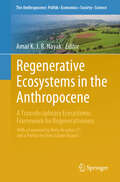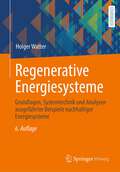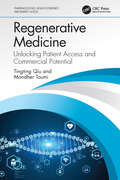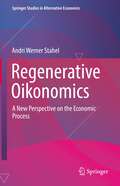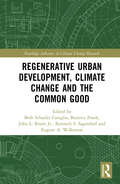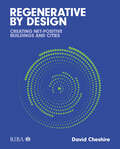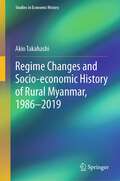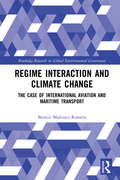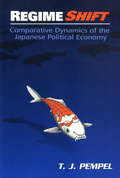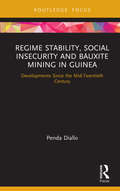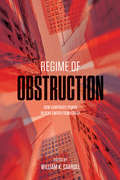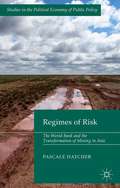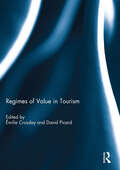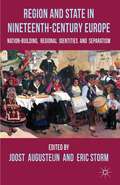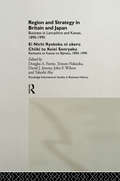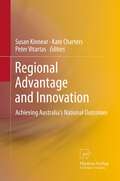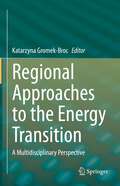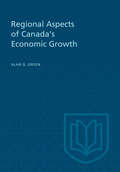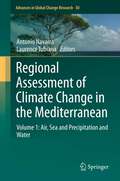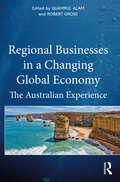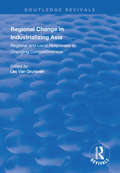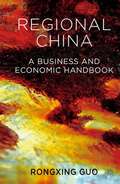- Table View
- List View
Regenerative Ecosystems in the Anthropocene: A Transdisciplinary Ecosystemic Framework for Regenerativeness (The Anthropocene: Politik—Economics—Society—Science #38)
by Amar K. J. R. NayakThe book offers a transdisciplinary eco-systemic framework for analysis of ecosystems. It uses eight dimensions (economic-social-political-environmen-tal) and 40 factors to diagnose degenerating ecosystems and to synthesize regenerative ecosystems amid growing uncertainty, and inequality in the Anthropocene. Chapter 1 broadly defines the `all interacting evolving systems science' (AIESS) approach in terms of its eco-systemic and transdisciplinary action research methodology. Chapter 2 provides a detailed explanation of the AIESS approach through the four concepts of interconnectedness, interdependence, interactions, and intent to diagnose degeneration and synthesize regenerative systems. Part 1 of the book discusses the issues and approaches to Regenerativeness. Part 2, 3, 4, and 5 illustrate cases of regenerative systems in different ecosystems viz. natural, rural-indigenous, urban, and industrial ecosystems.Not only the researchers and scholarsin systems science, systems dynamics, systems design, and sustainable transition strategies but also the policy makers, corporate leaders, and development experts will greatly benefit from this book.1. Presents a ground breaking explanation of the science of change in the Anthropocene and in epochs prior to it through its all interacting evolving systems science framework. 2. Provides a unique transdisciplinary eco-systemic framework as a methodology to diagnose the complex degenerating ecosystems and to synthesize regenerative ecosystems in different geographies of the world. 3. Through various cases from different ecosystems viz., natural ecosystems, rural-indigenous ecosystems, urban ecosystems, and industrial ecosystems, the book presents the challenges as well as the steps and processes to synthesize regenerative ecosystems.
Regenerative Energiesysteme: Grundlagen, Systemtechnik und Analysen ausgeführter Beispiele nachhaltiger Energiesysteme
by Holger WatterDie erneuerbaren Energien spielen angesichts des fortschreitenden Klimawandels eine größere Rolle denn je. Dieses Lehrbuch stellt die relevanten nachhaltigen Energiesysteme und ihre Funktionsmechanismen dar, geht auf die Einflussparameter ein und erläutert Potentiale durch Überschlagsrechnungen. Die Möglichkeiten für technische Projekte werden vornehmlich für Privatpersonen, aber auch den industriellen Anlagenbau aufgezeigt. Aufgaben und ihre zugehörigen Lösungen unterstützen das Verständnis für die abgebildeten Zusammenhänge. Die 6. Auflage des Buches beinhaltet neben überarbeiteten und neuen Abbildungen einen vollständig neuen Abschnitt zu synthetischen Kraftstoffen. Hier wird neben den zur Verfügung stehenden Prozessen auch auf die Effizienz und physikalischen Grenzen der Verfahren eingegangen.
Regenerative Medicine: Unlocking Patient Access and Commercial Potential (Pharmaceuticals, Health Economics and Market Access)
by Mondher Toumi Tingting QiuA comprehensive review of the challenges that exist in patient accessibility to regenerative medicines (RMs), presenting clinical trials, marketing authorization, HTA, pricing, reimbursement, affordability, payment and partnership agreements of RMs and commercialization. Specfically, we investigated how COVID-19 has impacted the RM industry by elaborating on the disruptions it caused but also the new opportunities it brought. The ultimate goal of this work is to make strategic recommendations for manufacturers and decisions-makers on effective strategies to address the above obstacles and facilitate patient access to promising regenerative medicines.FEATURES Regenerative medicine (RM) is an emerging interdisciplinary field aiming to replace or regenerate human cells, tissues, or organs in order to restore normal function. RM holds the promise of revolutionizing treatment in the 21st century. RMs bring new hope for some previously untreatable diseases, as well as holding promise for the treatment of common chronic diseases. Rapid advancements in biotechnology and improved understanding of disease pathophysiology have attracted tremendous interests in the development of RMs. Discusses the high cost of RMs which may challenge the sustainability of healthcare insurers (public and private).
Regenerative Oikonomics: A New Perspective on the Economic Process (Springer Studies in Alternative Economics)
by Andri Werner StahelThis book presents a unique real-world-centred approach to economic life from a phenomenological approach. It offers a much-needed alternative to conventional economic thinking, giving a transdisciplinary depiction of the economic process’s social, cultural, technological, political, and ecological dimensions. Doing so appeals to students and researchers in economics aiming to get an alternative to the reductionist model-based approach.Written in a jargon-free and non-technical way, it appeals to non-economists alike and those seeking a more profound and living understanding of the economic process. What is the role of nature in the economic process? Is there more to economics than we have been told? Do we have infinite needs? What are these needs? Can we keep on growing forever? Does economic growth improve our wellbeing? Why is the income gap widening? What is the role of financial capital in our current world? Are there other forms of producing, distributing, and consuming wealth beyond markets? What are the functions of markets, and how do they work in the real world? These and many other aspects are discussed in living and holistic ways in this book. It is a must-read for all those interested in gaining a more profound and genuine understanding of our current reality and those looking for ways out of our current crises.
Regenerative Urban Development, Climate Change and the Common Good (Routledge Advances in Climate Change Research)
by Beth Schaefer Caniglia Beatrice Frank John L. Knott S. Sagendorf Kenneth Eugene A. WilkersonThis volume focuses on the theory and practice of the regenerative development paradigm that is rapidly displacing sustainability as the most fertile ground for climate change adaptation research. This book brings together key thinkers in this field to develop a meaningful synthesis between the existing practice of regenerative development and the input of scholars in the social sciences. It begins by providing an expert introduction to the history, principles, and practices of regenerative development before going on to present a thorough theoretical examination by known theorists from disciplines including sociology, geography, and ethics. A section on regenerative development practices illustrates the need to significantly advance our understanding of how urbanization, climate change, and inequality interact at every scale of development work. Finally, the book ends with a serious consideration of the ways in which integrated systems thinking in higher education could result in a curriculum for the next generation of regenerative development professionals. Regenerative Urban Development, Climate Change and the Common Good will be of great interest to students, scholars, and practitioners of regenerative development, climate change, urban planning, and public policy.
Regenerative by Design: Creating living buildings and cities
by David CheshireHow do we design cities and buildings that metabolise, use living materials and are net positive - that give back more to the planet than they take?Our cities and buildings are a drain on the planet, requiring huge amounts of resources and tracts of land to support their needs, and destroying biodiversity in the process. The idea of living, regenerative buildings is gaining ground - buildings that give back more than they take, providing habitats, ecosystems services (e.g. clean water, clean air), locally-grown food, and putting humans back in touch with the natural world.The climate and biodiversity crisis has driven organisations to set ambitious net zero carbon and ESG targets: however, many are struggling to see how to achieve them and often doing the same thing, but expecting a different result.This book sets out the regenerative building agenda and design principles, showing how buildings, towns and cities could start to have a positive impact on our planet, providing ecosystems services and living within the means afforded by the site.
Regieren als Königin - Inspiration von Königin Esther
by Dy Wakefield Franziska MüllerRegieren als Königin - Inspiration von Königin Esther
Regime Changes and Socio-economic History of Rural Myanmar, 1986-2019 (Studies in Economic History)
by Akio TakahashiThis is the first book to depict the transformation and steadiness of Myanmar’s rural socio-economy from within the villages based on my own detailed research, in relation with the regime changes from Burmese Way to Socialism to military junta and to democratization from 1986 to 2019.The main subject of the transformation is “de-agrarianisation” including land use and holdings, household incomes, non-, migrations, power structure, village landscape, etc. And the principal theme of the steadiness is the “absence of village collective” which is the core of rural Myanmar, in contrast to village communities like Japan. This is the reason why Myanmar villagers have lived surprisingly bright, free and independent despite the oppressive political economy under the socialism and the military junta, and have not collectively participated in so-called community development.This book is the result of research conducted by visiting more than 200 villages and interviewing more than 10,000 people by myself in Myanmar language.
Regime Interaction and Climate Change: The Case of International Aviation and Maritime Transport (Routledge Research in Global Environmental Governance)
by Beatriz Martinez RomeraThe regulation of greenhouse gas emissions from international aviation and maritime transport has proved to be a difficult task for international climate negotiations such as the Paris Agreement in 2015. Almost two decades prior, Article 2.2 of the Kyoto Protocol excluded emissions from international aviation and maritime transport from its targets, delegating the negotiation of sector-specific regulations to the International Civil Aviation Organization (ICAO) and the International Maritime Organization (IMO), respectively. However, progress at these venues has also been limited. Regime Interaction and Climate Change maps out the legal frameworks in the Climate, ICAO and IMO regimes, and explores the law-making process for the regulation of international aviation and maritime transport through the lenses of fragmentation of international law and regime interaction. The book sheds light on how interaction between these three regimes occurs, what the consequences of such interaction are and how they can be managed to resolve conflicts and promote synergies. This book will be of great interest to scholars of international environmental law and governance, climate change policy and climate change law.
Regime Shift: Comparative Dynamics of the Japanese Political Economy (Cornell Studies in Political Economy)
by T. J. PempelThe Liberal Democratic Party, which dominated postwar Japan, lost power in the early 1990s. During that same period, Japan's once stellar economy suffered stagnation and collapse. Now a well-known commentator on contemporary Japan traces the political dynamics of the country to determine the reasons for these changes and the extent to which its political and economic systems have been permanently altered.T. J. Pempel contrasts the political economy of Japan during two decades: the 1960s, when the nation experienced conservative political dominance and high growth, and the early 1990s, when the "bubble economy" collapsed and electoral politics changed. The different dynamics of the two periods indicate a regime shift in which the present political economy deviates profoundly from earlier forms. This shift has involved a transformation in socioeconomic alliances, political and economic institutions, and public policy profile, rendering Japanese politics far less predictable than in the past. Pempel weighs the Japanese case against comparative data from the United States, Great Britain, Sweden, and Italy to show how unusual Japan's political economy had been in the 1960s. Regime Shift suggests that Japan's present troubles are deeply rooted in the economy's earlier success. It is a much-anticipated work that offers an original framework for understanding the critical changes that have affected political and economic institutions in Japan.
Regime Stability, Social Insecurity and Bauxite Mining in Guinea: Developments Since the Mid-Twentieth Century (Routledge Studies of the Extractive Industries and Sustainable Development)
by Penda DialloThis book explores how bauxite mining has affected local and national political dynamics in Guinea over the past 55 years, providing an overview of mining interactions with social, economic and political spheres. Guinea is amongst the world’s top producers of bauxite, and the country’s rich mineral presence has numerous implications on local communities and national policy. Guinea is an interesting and highly relevant case study in assessing the impact of bauxite mining on regime stability and social insecurity. The author offers a clear understanding of the role of mining during the Touré and Conté regimes and analyses how changes since the election of Condé in 2010 have affected the socio-political and economic development of Guinea. The author also offers analysis on how bauxite mining has led to the emergence of new forms of social contracts, sustained by mining companies instead of the state. Finally, the book argues that understanding the stabilising and destabilising potential of mining is key to ensuring long-term, sustainable, stable and inclusive growth of mineral-resource-rich countries. The book concludes by highlighting the relevance of the findings in Guinea for the wider African extractives sector. The book will be of interest to a wide range of scholars, including those working in the areas of African studies, political science, political economy, sustainable development and corporate social responsibility. The book will be relevant for academics, business actors, NGOs, policy-makers and students interested in the African mining sector.
Regime of Obstruction: How Corporate Power Blocks Energy Democracy
by William K. CarrollRapidly rising carbon emissions from the intense development of Western Canada's fossil fuels continue to aggravate the global climate emergency and destabilize democratic structures. The urgency of the situation demands not only scholarly understanding, but effective action. Regime of Obstruction aims to make visible the complex connections between corporate power and the extraction and use of carbon energy. Edited by William Carroll, this rigorous collection presents research findings from the first three years of the seven-year, SSHRC-funded partnership, the Corporate Mapping Project. Anchored in sociological and political theory, this comprehensive volume provides hard data and empirical research that traces the power and influence of the fossil fuel industry through economics, politics, media, and higher education. Contributors demonstrate how corporations secure popular consent, and coopt, disorganize, or marginalize dissenting perspectives to position the fossil fuel industry as a national public good. They also investigate the difficult position of Indigenous communities who, while suffering the worst environmental and health impacts from carbon extraction, must fight for their land or participate in fossil capitalism to secure income and jobs. The volume concludes with a look at emergent forms of activism and resistance, spurred by the fact that a just energy transition is still feasible. This book provides essential context to the climate crisis and will transform discussions of energy democracy. Contributions by Laurie Adkin, Angele Alook, Clifford Atleo, Emilia Belliveau-Thompson, John Bermingham, Paul Bowles, Gwendolyn Blue, Shannon Daub, Jessica Dempsey, Emily Eaton, Chuka Ejeckam, Simon Enoch, Nick Graham, Shane Gunster, Mark Hudson, Jouke Huizer, Ian Hussey, Emma Jackson, Michael Lang, James Lawson, Marc Lee, Fiona MacPhail, Alicia Massie, Kevin McCartney, Bob Neubauer, Eric Pineault, Lise Margaux Rajewicz, James Rowe, JP Sapinsky, Karena Shaw, and Zoe Yunker.
Regimes of Risk
by Pascale HatcherThe World Bank and New Mining Regimes in Asia critically investigates the particular role played by the World Bank Group (WBG) in both conceptualising and promoting new mining regimes tailored for resource-rich country clients. Building on case studies located in Laos, Mongolia and the Philippines, the author details a particular politics of mining in the Global South characterised by the transplanting, hijacking and contesting of the WBG's mining agenda in national and local arenas. Importantly, the failings of this agenda over time have not proved terminal but have rather provided opportunities for paradigmatic renewal. As part of a broad regime of governance designed to attract foreign private sector investment by the WBG in the name of poverty reduction, novel socio-environmental safeguards and the enrolment of civil society have now become a new porte-etandard to once again legitimise continued and expanded involvement in the mining sector. However, much like earlier incarnations of neoliberalism in the mining sector, the promotion by the WBG of this new Social Development Model continues to exhibit serious repercussions for constituents in the Global South, bringing into question the legitimacy of the model itself. "
Regimes of Value in Tourism
by Émilie Crossley and David PicardDrawing from ethnographic work in five continents, this book demonstrates how different regimes of value in tourism can coexist, collide, and compete across a varied geographic terrain. Much theory in tourism economics defines ‘value’ as a measure of monetary worth, a concept governing commodity exchange, and a gauge for tourist satisfaction. The research included in this volume shows that tourism not only feeds off existing conceptions of value as a monetary category, but that it is also instrumental in reproducing and reinforcing those subjective, morally heightened, and highly intangible values that make tourism and the tourism economy a complex social, cultural, political, and psychological phenomenon. The book pushes the debate about the tourism economy beyond a simplistic understanding of producer-consumer relations, instead suggesting a refocus on the social, spatial, and temporal lags in tourism production, and the ensuing differentiated regimes of values.This book was published as a special issue of the Journal of Tourism and Cultural Change.
Region and State in Nineteenth-Century Europe: Nation-Building, Regional Identities and Separatism
by Joost Augusteijn Eric StormIn reaction to the centralizing nation-building efforts of states in nineteenth-century Europe, many regions began to define their own identity. In thirteen stimulating essays, specialists analyze why regional identities became widely celebrated towards the end of that century and why some considered themselves part of the new national self-image.
Region and Strategy in Britain and Japan: Business in Lancashire and Kansai 1890-1990 (Routledge International Studies in Business History #Vol. 7)
by John F. Wilson Douglas A. Farnie Tetsuro Nakaoka David J. Jeremy Takeshi AbeHighlighting the importance of regional and national differences in industrial development, this book is a pioneering long term comparison of the two regions of Lancashire and Kansai.
Regional Advantage
by Annalee SaxenianLike the Greeks who sailed with Jason in search of the Golden Fleece, the new Argonauts--foreign-born, technically skilled entrepreneurs who travel back and forth between Silicon Valley and their home countries--seek their fortune in distant lands by launching companies far from established centers of skill and technology. Their story illuminates profound transformations in the global economy. Economic geographer AnnaLee Saxenian has followed this transformation, exploring one of its great paradoxes: how the "brain drain" has become "brain circulation," a powerful economic force for development of formerly peripheral regions. The new Argonauts--armed with Silicon Valley experience and relationships and the ability to operate in two countries simultaneously--quickly identify market opportunities, locate foreign partners, and manage cross-border business operations. The New Argonauts extends Saxenian's pioneering research into the dynamics of competition in Silicon Valley. The book brings a fresh perspective to the way that technology entrepreneurs build regional advantage in order to compete in global markets. Scholars, policymakers, and business leaders will benefit from Saxenian's firsthand research into the investors and entrepreneurs who return home to start new companies while remaining tied to powerful economic and professional communities in the United States. For Americans accustomed to unchallenged economic domination, the fast-growing capabilities of China and India may seem threatening. But as Saxenian convincingly displays in this pathbreaking book, the Argonauts have made America richer, not poorer.
Regional Advantage and Innovation
by Kate Charters Peter Vitartas Susan KinnearRegional areas are key building blocks of society in many countries. This compilation uses Australian case study examples to demonstrate how regional areas are uniquely well-placed to contribute to national goals in innovation, infrastructure provision, water and food security, environmental sustainability, industry diversification, healthy and liveable communities, and natural disaster preparedness and response. Each of these themes is examined in the context of using innovative approaches from regions to deliver outcomes that are nationally significant. Authorship is drawn from a balance of leading practitioners and academics to provide stories that are both engaging and rigorous. The case studies are contextualised by an analysis of regional advantage literature, discussion on the regional policy implications and lessons, and commentary around the key trends and drivers for innovation and regional advantage in Australia. The book provides a convincing argument that focusing on regional innovation and development offers significant benefits to a nation as a whole.
Regional Approaches to the Energy Transition: A Multidisciplinary Perspective
by Katarzyna Gromek-BrocThe book"Regional Approaches to the Energy Transition", discusses the key challenges the energy transition is facing at the European and International level. It is an edited collection gathering contributions from the experts in the field bringing together internationally renowned scholars, researchers, EU officials to address the current trends in the energy transition and its dilemmas.The book places the energy transition in a wide interdisciplinary context. It looks at energy policies, legal framework, regional strategies and the difficulties in their implementation. It argues for a regional approach to the energy transition, questioning at the same time the strategies and measures put forward for its realisation. The subject matter is topical, considering recent themes that occupy global and European political agendas.In a nutshell, the volume offers insights into regional regulations, public policies and local practices on the use of clean energy. It looks first at the EU commitment and its initiatives providing some examples from the Member States. Furthermore, it offers a comparative perspective and discusses the different approaches to the energy transition from Latin America, China, Africa and Australia. It covers a wide range of topics such as the EU renewable energy policies, Green Deal and regionalisation, energy auctions in the EU, environment in contemporary constitutionalism, Human Rights considerations, the Scandinavian perspective, practical examples from Italy and Spain. Moreover, it also considers the global context, looking at State and Market in China's coal-to-gas transition, tendencies of legal regulation in the sphere of renewable energy in Russia, the energy transition in Latin-American countries, regional approach to the energy transition and electricity access initiatives in Sub-Saharan Africa, and transnationalism and the regional approach to the energy transition in Australia. The systematisation that this book offers and the exchange of good practices and experiences are useful tools for the key players to seriously engage with a just and sustainable energy transition. The proposed book is a reference and study material for academics and students, but also for the policy makers, officials and practitioners dealing with the energy transition. It provides some answers, potential solutions and alternatives to the main problems that the energy sector is facing worldwide.
Regional Aspects of Canada's Economic Growth
by Alan G. GreenRegional disparities in income have been an important part of the growth of experience of most nation states. Canada is no exception. In a large country, thinly populated and having a wide diversity of resources, cultures, and locational advantages, it is only natural to expect the existence of dissimilar levels of economic performance. In fact, just this diversity of physical and human backgrounds has often provided the primary thrust for variations in natural economic growth. If, therefore, a better understanding of national development is to be obtained, some attention to the growth experience of the subnational units is imperative. This study aims at widening our understanding of the Canadian growth process by focusing on the relationship between regional and national changes since the last decade of the nineteenth century.
Regional Assessment of Climate Change in the Mediterranean
by Antonio Navarra Laurence TubianaThis is the third volume of a three-volume final report, which thoroughly describes, synthesizes and analyzes the results of the four-year Integrated Research Project CIRCE - Climate Change and Impact Research: Mediterranean Environment, funded by the EU 6th Framework Programme. Conducted under the auspices of the National Institute of Geophysics and Volcanology in Rome, Italy, the study was designed to predict and to quantify the physical impacts of climate change in the Mediterranean, and to assess the most influential consequences for the population of the region.
Regional Businesses in a Changing Global Economy: The Australian Experience
by Quamrul AlamIn a highly globalised trade and investment environment, businesses in regional areas must learn to take advantage of the benefits that stem from their geographical location. This book explains the immense value regional businesses bring to local communities and to Australia as a whole through case studies. The case studies are diverse in nature and highlight how regional businesses utilise their competitive advantage to introduce innovative practices and use local expertise, knowledge, skills, and networks to benefit from local social capital in a synergetic manner. The case studies in the book will help readers better understand the processes of industrial localisation. The examples of how innovative regional businesses have used innovative practices, local resource leverage, social and entrepreneurial skills and knowledge of international markets to develop and expand their businesses will provide insights into how regional businesses can achieve growth and secure jobs in an innovative and sustained manner.
Regional Change in Industrializing Asia: Regional and Local Responses to Changing Competitiveness (Routledge Revivals)
by Leo van GrunsvenFirst published in 1998 this boo responds to the dynamics of Industrializing Asia and the behavioural changes of actors which, in response to changing internal and external forces, have given rise to and are constantly giving rise to alterations in patterns of growth. From a geographical perspective, these are expressed in regional change, understood as a reconstruction of spatial organization. The imperatives of dynamic comparative advantage, changing global or regional competitiveness, and regional competition, faced by different actors, entities or territorial units can be identified as important forces underlying and shaping regional change. This volume provides further illumination, contextualization and interpretation of the spatiality of the economic reality in Industrializing Asia, as well as the role played by, and the implications for, different actors. The objectives of this book are 1) to outline the processes of regional change, linked to responses in the form of restructuring and integrative and regionalization tendencies, as well as the realignment of the global-regional-local divide in production systems/complexes and the operation of firms associated with reorganization of production in the process of maintaining and reconfiguring comparative advantage; 2) to highlight the wide scope of the process by considering differential units of analysis, linked to the agents and manifestations of regional change, and the role of scale in terms of the spatial units involved; 3) to highlight the implications as to the current and future position or role of differential actors/agents (particularly nation state) in shaping the new economic reality in the region and as a corollary, its positioning in the global economic order.
Regional China
by Rongxing Guo Luc Changlei GuoIt is a resource book that profiles the geography, demography, economy, political environment and business climates for each of China's 31 provinces. It will become a useful source book to researchers, businesses, government agencies, and news media interested in either the rapidly changing provincial economies or the Chinese economy as a whole.
